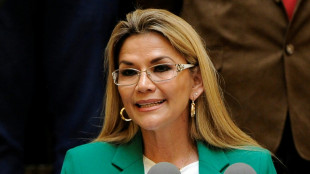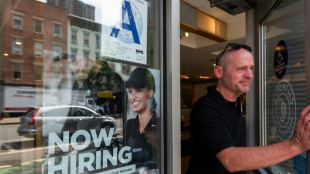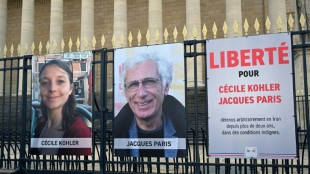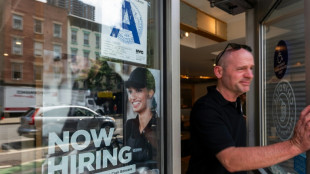
-
 BMW reports rising profitability, shares jump
BMW reports rising profitability, shares jump
-
Bolivia Supreme Court orders release of jailed ex-president Jeanine Anez

-
 Wall Street stocks rise after positive jobs data
Wall Street stocks rise after positive jobs data
-
'Hostage diplomacy': longstanding Iran tactic presenting dilemma for West

-
 Rybakina stays perfect at WTA Finals with win over alternate Alexandrova
Rybakina stays perfect at WTA Finals with win over alternate Alexandrova
-
Le Garrec welcomes Dupont help in training for Springboks showdown

-
 Brussels wants high-speed rail linking EU capitals by 2040
Brussels wants high-speed rail linking EU capitals by 2040
-
Swiss business chiefs met Trump on tariffs: Bern

-
 Spain's exiled king recounts history, scandals in wistful memoir
Spain's exiled king recounts history, scandals in wistful memoir
-
Wall Street stocks steady after positive jobs data

-
 Trump blasts Democrats as government shutdown becomes longest ever
Trump blasts Democrats as government shutdown becomes longest ever
-
Indian pilgrims find 'warm welcome' in Pakistan despite tensions

-
 Inter and AC Milan complete purchase of San Siro
Inter and AC Milan complete purchase of San Siro
-
Swedish authorities inspect worksite conditions at steel startup Stegra

-
 Keys withdraws from WTA Finals with illness
Keys withdraws from WTA Finals with illness
-
Prince Harry says proud to be British despite new life in US

-
 EU strikes last-ditch deal on climate targets as COP30 looms
EU strikes last-ditch deal on climate targets as COP30 looms
-
Stocks retreat as tech bubble fears grow

-
 Shein opens first permanent store amid heavy police presence
Shein opens first permanent store amid heavy police presence
-
West Indies edge New Zealand despite Santner brilliance

-
 French pair released by Iran await return home
French pair released by Iran await return home
-
German factory orders up but outlook still muted

-
 Death toll tops 100 as Philippines digs out after typhoon
Death toll tops 100 as Philippines digs out after typhoon
-
Attack on key city in Sudan's Kordofan region kills 40: UN

-
 'No one could stop it': Sudanese describe mass rapes while fleeing El-Fasher
'No one could stop it': Sudanese describe mass rapes while fleeing El-Fasher
-
Champagne and cheers across New York as Mamdani soars to victory

-
 Medieval tower collapse adds to Italy's workplace toll
Medieval tower collapse adds to Italy's workplace toll
-
BMW boosts profitability despite China, tariff woes

-
 South Africa's Wiese wary of 'hurt' France before re-match
South Africa's Wiese wary of 'hurt' France before re-match
-
Beyond limits: Croatian freediver's breathtaking record

-
 Tottenham supporting Udogie after alleged gun threat in London
Tottenham supporting Udogie after alleged gun threat in London
-
Thunder roll Clippers to stay unbeaten as SGA keeps streak alive

-
 In appeal, Australian mushroom murderer alleges 'miscarriage of justice'
In appeal, Australian mushroom murderer alleges 'miscarriage of justice'
-
Toyota hikes profit forecasts 'despite US tariffs'

-
 Ex-France lock Willemse challenges Meafou to become 'the bully'
Ex-France lock Willemse challenges Meafou to become 'the bully'
-
Ukrainians to honour sporting dead by building country they 'died for': minister

-
 At least 7 dead after UPS cargo plane crashes near Louisville airport
At least 7 dead after UPS cargo plane crashes near Louisville airport
-
US Supreme Court hears challenge to Trump tariff powers

-
 US government shutdown becomes longest in history
US government shutdown becomes longest in history
-
India's Modi readies bellwether poll in poorest state

-
 Green goals versus growth needs: India's climate scorecard
Green goals versus growth needs: India's climate scorecard
-
Where things stand on China-US trade after Trump and Xi talk

-
 Sri Lanka targets big fish in anti-corruption push
Sri Lanka targets big fish in anti-corruption push
-
NY elects leftist mayor on big election night for Democrats

-
 Injured Jordie Barrett to miss rest of All Blacks tour
Injured Jordie Barrett to miss rest of All Blacks tour
-
Asian markets tumble as tech bubble fears grow

-
 Pay to protect: Brazil pitches new forest fund at COP30
Pay to protect: Brazil pitches new forest fund at COP30
-
Iraq's social media mercenaries dying for Russia

-
 Young leftist Trump foe elected New York mayor
Young leftist Trump foe elected New York mayor
-
Concerns at ILO over expected appointment of close Trump advisor


How social media can 'trigger' eating disorders in young people
Social media can push vulnerable young people towards developing eating disorders by glorifying thinness and promoting fake, dangerous advice about diet and nutrition, experts warn.
Young women and girls are much more likely to suffer from illnesses such as anorexia, bulimia and binge eating disorder, though rates among men have been increasing.
Research has shown the percentage of people worldwide who have had some kind of eating disorder during their lives rose from 3.5 percent in 2000 to 7.8 percent in 2018, a timeframe that captures the rise of social media.
For the professionals trying to help teenagers recover from these disorders, misinformation from influencers on platforms such as TikTok and Instagram is a huge problem.
"We no longer treat an eating disorder without also addressing social media use," French dietitian and nutritionist Carole Copti told AFP.
"It has become a trigger, definitely an accelerator and an obstacle to recovery," she added.
The causes of eating disorders are complex, with psychological, genetic, environmental and social factors all having the potential to make someone more susceptible.
Social media "is not the cause but the straw that may break the camel's back," said Nathalie Godart, a psychiatrist for children and adolescents at the Student Health Foundation of France.
By promoting thinness, strictly controlled diets and relentless exercise, social media weakens already vulnerable people and "amplifies the threat" to their health, she told AFP.
- 'Vicious cycle' -
Just one recent example is the #skinnytok trend, a hashtag on TikTok full of dangerous and guilt-inducing advice encouraging people to drastically reduce how much food they eat.
For Charlyne Buigues, a French nurse specialising in eating disorders, social media serves as a gateway to these problems, which are "normalised" online.
She condemned videos showing young girls with anorexia exposing their malnourished bodies -- or others with bulimia demonstrating their "purges".
"Taking laxatives or vomiting are presented as a perfectly legitimate way to lose weight, when actually they increase the risk of cardiac arrest," Buigues said.
Eating disorders can damage the heart, cause infertility and other health problems, and have been linked to suicidal behaviour.
Anorexia has the highest rate of death of any psychiatric disease, research has found. Eating disorders are also the second leading cause of premature death among 15- to 24-year-olds in France, according to the country's health insurance agency.
Social media creates a "vicious cycle," Copti said.
"People suffering from eating disorders often have low self-esteem. But by exposing their thinness from having anorexia on social media, they gain followers, views, likes... and this will perpetuate their problems and prolong their denial," she added.
This can especially be the case when the content earns money.
Buigues spoke of a young woman who regularly records herself throwing up live on TikTok and who had "explained that she was paid by the platform and uses that money to buy groceries".
- 'Completely indoctrinated' -
Social media also makes recovering from eating disorders "more difficult, more complicated and take longer", Copti said.
This is partly because young people tend to believe the misleading or fake diet advice that proliferates online.
Copti said consultations with her patients can feel like she is facing a trial.
"I have to constantly justify myself and fight to make them understand that no, it is not possible to have a healthy diet eating only 1,000 calories -- that is half what they need -- or that no, it is not normal to skip meals," she said.
"The patients are completely indoctrinated -- and my 45-minute weekly consultation is no match for spending hours every day on TikTok," she added.
Godart warned about the rise of people posing as "pseudo-coaches", sharing incorrect, "absurd" and potentially illegal nutrition advice.
"These influencers carry far more weight than institutions. We're constantly struggling to get simple messages across about nutrition," she said, pointing out that there are lifelines available for those in need.
Buigues takes it upon herself to regularly report problematic content on Instagram, but said it "serves no purpose".
"The content remains online and the accounts are rarely suspended -- it's very tiring," she said.
The nurse has even advised her patients to delete their social media accounts, particularly TikTok.
"It may seem radical but until young people are better informed, the app is too dangerous," she said.
R.Buehler--VB




